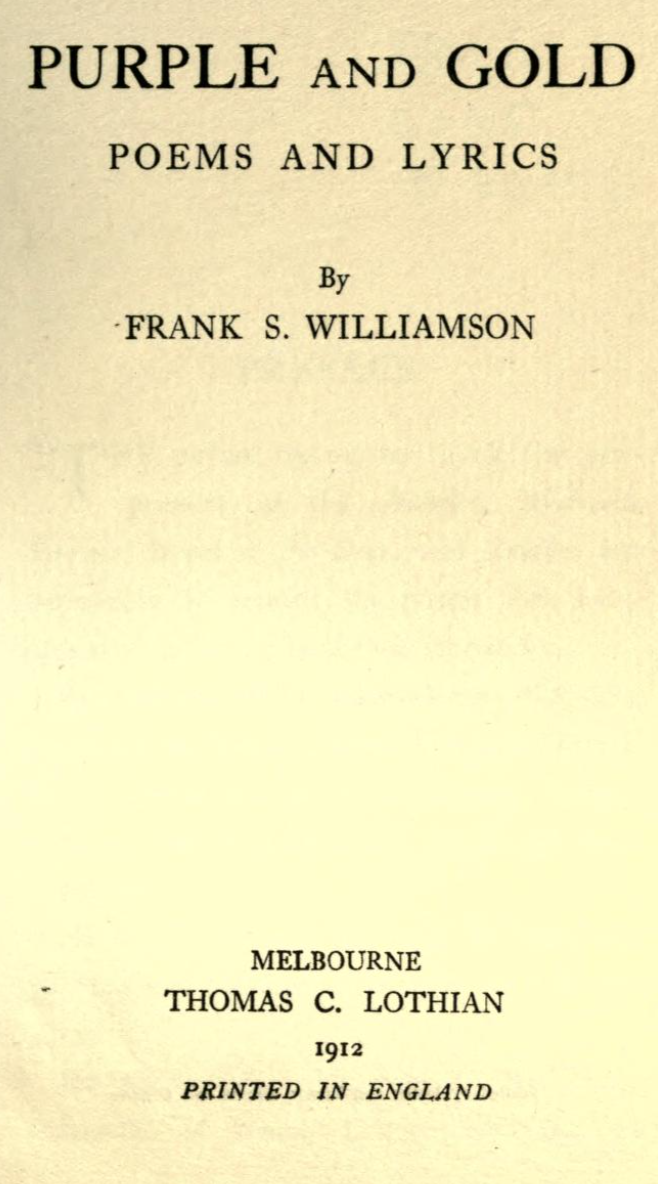Frank S. Williamson, Purple and Gold: Poems and Lyrics (1912)
Many of the books in the Menzies Collection contain loose sheets or slips of paper which offer a glimpse into a moment in time in Sir Robert’s life.
Frank Williamson was a Victorian schoolteacher who spent his spare time writing poetry, and eventually became a celebrated Australian poet. He spent two stints teaching at Wesley College, imbuing the school with a strong artistic culture. Frederick Eggleston, whom Menzies would appoint as Australia’s first Ambassador to China in 1941, recalled how Williamson inspired many of the Wesley boys to fall in love with poetry and to try to write their own verse.
While Williamson was dismissed for drunkenness in 1904, his cultural legacy within the school lived on. Not only was Menzies, who enrolled in 1910, himself an amateur poet, but his schoolmate Alan Kerr became something of a child prodigy when it came to composing music. Wedged within Menzies’s copy of Purple and Gold is a loose page of sheet music torn from Wesley College Songs. The page features the song ‘Lost Leader’, with lyrics written by the school’s headmaster Larence Adamson, and music by Kerr.
Shortly after the two boys had graduated from Wesley, they would engage in a similar exercise, writing the song ‘The Forest Call’. Menzies’s lyrics read:
Softly sway the branches,
Rustling in the breeze,
Whisp’ring notes of gladness,
Murm’rings of the trees.
Secret is their message, Words that none can tell;
Music sweet and mystic like some old-tie spell.
Over vale and mountain,
Where the fairies dream,
Floats the forest’s message,
Over lake and stream;
Onwards to the city,
With its rush and roar;
Hearken!
Still it calls us,
Calls us ever more.
The song was formally published in early 1914, receiving attention in several Australian newspapers and magazines. But praise was more forthcoming for Kerr’s music than Menzies’s words. Melbourne’s Table Talk called it ‘an attractive song, but of ordinary type, with fairly effective accompaniment’.
Tragically, Kerr would never get to live up to the promise his musical talents showed, for like so many young men of his generation, he met a premature end on the Western Front. Enlisting in January 1915, he served as a Lieutenant in the 24th infantry company. He survived the battle of Lone Pine before being killed by a shell blast at Pozieres on 27 July 1916. Two months later, newspapers published a poem he had written while serving on the Gallipoli peninsula, titled ‘To Australia’:
Beneath the splendour of the Southern Cross
In peace, we mourn with you the awful loss
Of thousands of our brothers who have shed
Their life-blood in the world-war’s stream of red;
A humbler cross its vigil sad now keeps
O’er many a spot where some brave hero sleeps.
O ye who love
The beautiful, the true, the pure, and sweet;
Let not a madman crush, beneath his feet
All you hold dear; the music and the art
Of centuries; be strong and play your part,
And show the world that he who will not give
A helping hand has lost the right to live.
O ye who see
Beyond this turmoil and chaotic strife,
Beyond this sinful waste of human life,
An age of gold, wherein mankind shall dwell
In highest heaven instead of deepest hell.
Be not afraid to spread your faith abroad.
But trust in God for strength—He is the Lord.
Sign up to our newsletter
Sign up for our monthly newsletter to hear the latest news and receive information about upcoming events.


